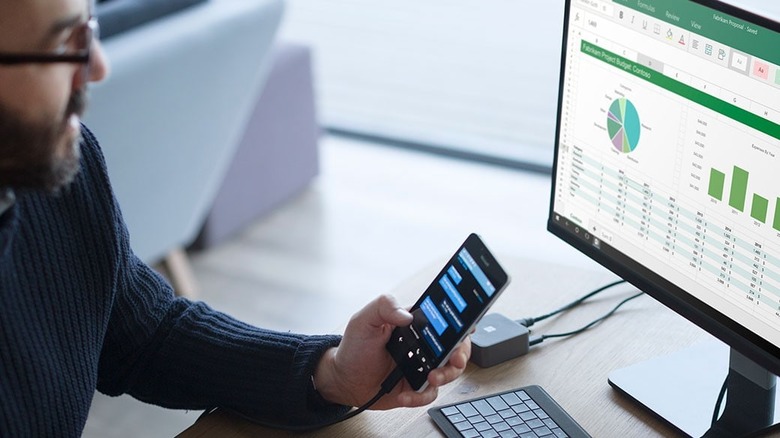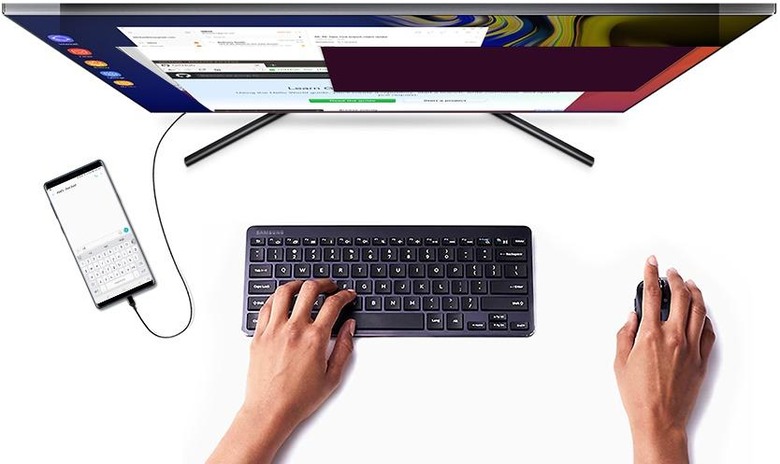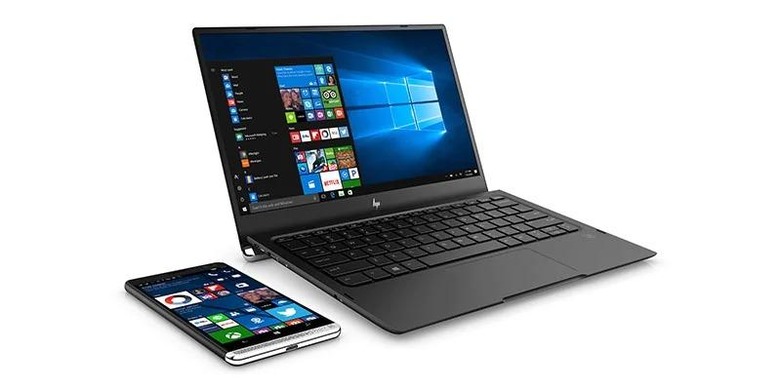Phone As A Desktop: Why No One Bought The Hype
Imagine this scenario. You arrive at work and very gracefully place your smartphone on a specially marked area of your desk. Almost immediately, your desk screen lights up, showing you today's tasks. Before you know it, it's lunch time and you quickly pick up your phone and head to the office cafeteria and use your phone to catch up on your social networks. Later that night at home, you dock your phone to add some finishing touches to your presentation tomorrow before finally plopping down on the couch to stream your favorite nighttime show. That was pretty much the idyllic scenario that companies like Microsoft, Samsung, and even Ubuntu maker Canonical tried to sell the public. But despite that enticing vision, it failed to take hold in the market because, like many future visions, it failed to take into account the hurdles of the present.
The promise
There are a couple of reasons why the scenario above is quite enthralling. Those same reasons also show have far removed the vision is from current reality. While that vision dangles a few benefits to modern computer users, it all revolves around one central idea: the smartphone as the one computing device you'll ever need.
Simplicity
This is the age of people having multiple devices to their name. Some would have more than one smartphone (where dual SIM phones are often not en vogue). Others would have a phone and a tablet. And that's just the mobile devices they almost always have with them. Desktop computers and laptops so make up the usual team that people work with every day. Wouldn't it be nice to just have one?
The idea of your phone also being your desktop computer gives a resounding "yes". You only need to carry one device and one device alone and set up "battle stations" at work and at home. Given how large their screens have become, smartphones have all but made tablets redundant anyway. Unfortunately, that doesn't take into account some of the limitations that the current hardware market has imposed on smartphones today.

Mobility
Having just your phone as your one computing device practically gives you the freedom to do anything anywhere. Work at your desk or work on the go. Kick back at home with a video or burn away time with games at a cafe. You won't have to fret over bringing your laptop with you or not because your phone is your laptop. And forget the mess of cables and chargers. You would only really need a power bank.
And you aren't by what you are doing, what you need to do it on, and where you need to do it. Just pick up your phone and go and pick up where you left off elsewhere. But while some companies were indeed close to making good on that promise, they sadly fell short in making that transition as seamless and painless as possible.
Freedom
Ultimately, what the "phone as a desktop" tries to offer is freedom, the freedom to perform any task at any place. At least at a convenient place. Users would no longer be forced to juggle multiple devices due to form factor or power. But like any freedom, there is a price to pay. And the market has proven unprepared to pay that price quickly enough for the vision to take hold.

The problem
Smartphone hardware has become ridiculously powerful. Smartphone cameras nibble away at the entry-level camera market. Mobile processors rival even laptop performance. And gaming is no longer something that can only be done on PCs or consoles. But despite the potential of the smartphone to really do it all, it was ultimately held back by elements that prove that it can't actually do it alone.
Hardware Ecosystem
Smartphones hardware may be capable but you could be considered a little unhinged if you insisted on doing everything on a phone by itself. On-screen keyboards will give your fingers cramps and even the largest phablet will make you squint and strain your neck. At the very least, you'll need keyborads, mice, external displays, hubs, the works. There might even be need for larger touch screens or support for external styluses. Sadly, accessory makers were slow to jump on the bandwagon, making early attempts practically moot.
But even the companies that were pushing the idea failed to actually take it to its logical conclusion. Because while using the phone as your only computing device gave you a lot of freedom, the lack of peripherals meant you could only really use it as a desktop while on a desk, with a large screen, keyboard, and mouse. Very few had the sensibility to make a laptop dock for those phones.

Software Limitations
As always, hardware is only one half of the problem. While Microsoft, Samsung, and Canonical focused on developing the software that would make that dream a reality, almost all of them stopped short of making the last steps that would actually turn theory into practice. Microsoft Continuum never stuck around long enough to see Windows 10 on ARM's fulfillment, Canonical bet on its own NIH technology that it ultimately abandoned, and Samsung seems to still be playing around with DeX too much.
There are a few hurdles that have never been overcome. The most immediate is the availability of a desktop, or at least desktop-like, apps on phones. And even if you could coat them in a desktop-like interface the way Samsung DeX does, the transition from phone to desktop and back is still jarring and disruptive. You even stand to lose your tabs or unsaved data when moving out of DeX back into the regular Android world.
Single Point of Failure
A phone that is your one and only phone offers a lot of freedom and flexibility but it also brings one very critical risk. You are putting all your eggs in one basket, a basket that is prone to breaking when dropped, easily lost, or, worse, stolen. In other words, it may even be a greater security risk.
Some might argue that most important files, including those for work, are stored in the cloud these days. Not exactly true, as some companies do have policies against the use of third-party remote storage for sensitive data. And we're still not at a point where remote computing and network bandwidth can give the illusion of using a local computer. And when that day comes, everything, even smartphones, will simply become thin, dumb clients for cloud-hosted computers.
The potential
The phone as a desktop campaign has mostly failed but it isn't dead yet. For all its shortcomings, the idea fatal flaw was that it was too ahead of its time and of the market. Samsung and, to some extent, Huawei, are still trying their luck. Samsung, in particular, is betting on offering a Linux desktop experience to make up for the lack of, say desktop Windows apps. Unless you're an avid (and advanced) Linux user, however, that might not mean much. And unless these and other proponents learn from how the execution has so far failed, they're unlikely to win in the second round.
